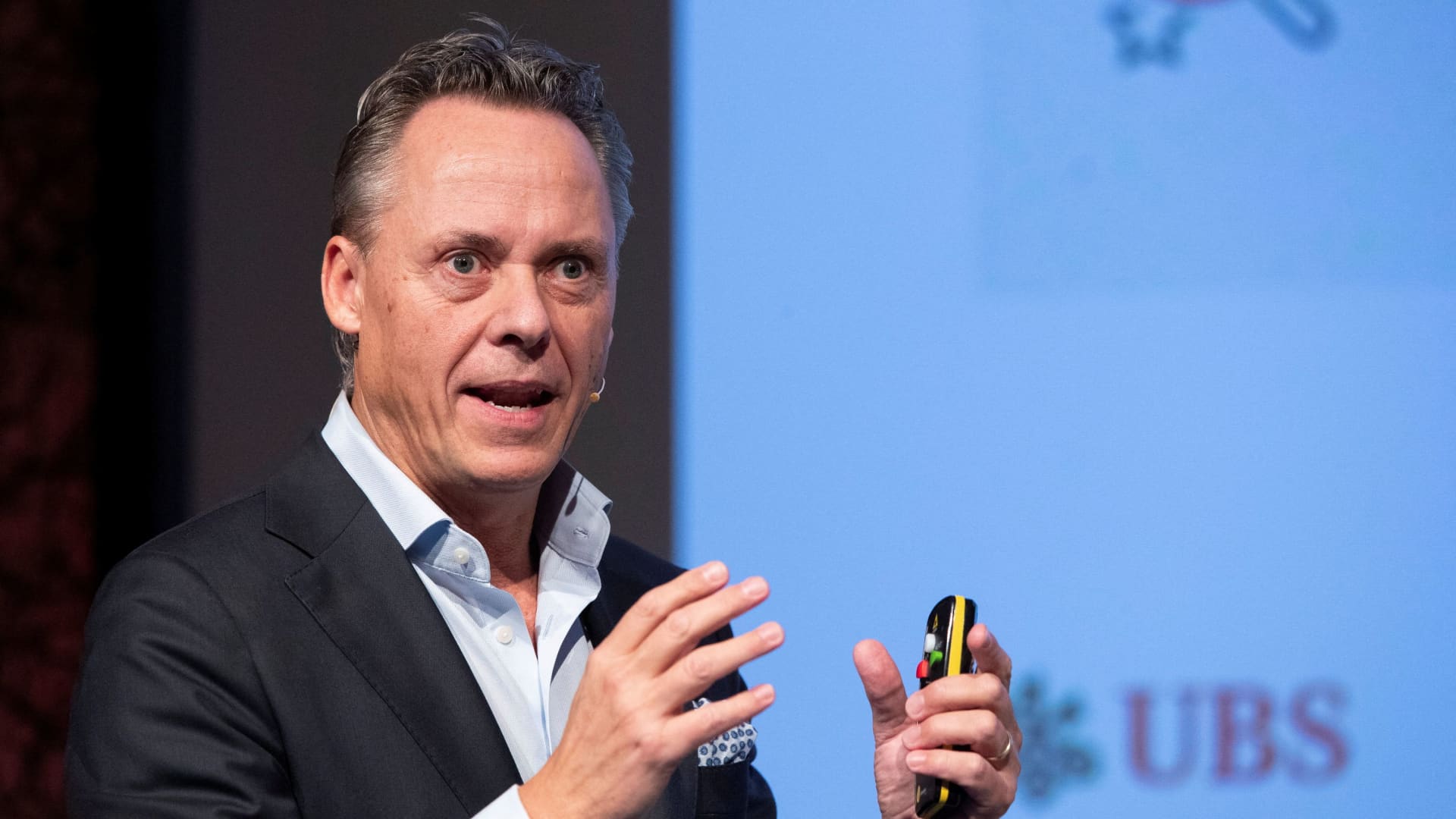‘The year of inflection’: Top bank CEOs weigh in on inflation outlook

CEO Ralph Hamers of Swiss bank UBS addresses the Annual Meeting of Swiss Financial Institute in Zurich, Switzerland, on Nov. 10, 2022.
Arnd Wiegmann | Reuters
2023 will be “the year of inflection” for the global economy, said UBS CEO Ralph Hamers on the sidelines of the World Economic Forum in Davos, Switzerland, where inflation, interest rates and economic growth are firmly in focus.
Investors are cautiously optimistic on the recent deluge of promising data from major economies, with inflation prints indicating that consumer price increases may be coming back to earth.
Central banks around the world have been tightening monetary policy aggressively in order to bring inflation back toward their respective targets. The hope that policymakers may be able to end the cycle of interest rate hikes, limiting potential damage to the global economy, would offer a boost to stock markets that took a hammering in 2022.
Speaking to CNBC on the sidelines of the WEF, Hamers suggested markets should wait for more rounds of key data points before determining that falling inflation has become a trend.
“We know that energy prices, other prices have a massive effect on some of this data as well coming through, either in terms of the psychological side of the spending or the real prices as well, so before that pans out into a trend, I think we have to be careful,” Hamers said.
“What we do believe is that certainly inflation is on the way back, both in the U.S. as well as in Europe, where we actually feel there is going to be a trough earlier in the year here in Europe than in the U.S. From that perspective, we also feel that while the year goes on, we will see more points where we think this will be the year of inflection.”
‘Inflation is not done’
While headline inflation has declined due in large part to falling energy and food prices, central banks have also remained laser-focused on labor markets for signs of entrenchment and upward wage pressure.
U.S. nonfarm payrolls increased by 223,000 in December, while the unemployment rate fell to 3.5% and average hourly earnings were up 4.6% from a year ago.
The U.K. labor market has also proven resilient, and against the backdrop of double-digit inflation, better-than-expected economic data and nationwide strike action, data suggests wage pressures may become persistent.
Average total pay (including bonuses) and average regular pay (excluding bonuses) rose by 6.4%, up from 6.2% and 6.1%, respectively. Although well above where the Bank of England would want pay growth to settle, those figures still resembled a decline when adjusted for inflation. In real terms, total and regular pay both dropped by 2.6%.
Although those pressures have shown signs of slowing in the latest figures, a continuation of labor market resilience would increase pressure on the U.S. Federal Reserve and the Bank of England to continue raising interest rates so as to prevent inflation from becoming structural.
Standard Chartered CEO Bill Winters told CNBC in Davos on Tuesday that he’s wary of concluding that inflation is over the hill, especially when looking at the global picture.
“Inflation is not done. We had the big energy price spike and we’re having the energy price decompression, partially, but underlying, the job market in the U.S. is still pretty strong, there are labor shortages around the world,” Winters said.
“Wage inflation, while possibly moderating a bit, I think is kind of structural, so I don’t think the Fed is quite done. I think they’ve got a couple of hikes left, but they’re going to be keeping a watchful eye on the impact of their actions on the economy.”
Winters noted that corporate and consumer balance sheets in the U.S. are still in good shape, meaning the economy can absorb higher rates more readily than in previous hiking cycles and suggesting the Fed “has got a way to go.”
He also pointed to recent “substantial outperformance of growth in emerging markets,” which could be furthered as China reopens its economy and demand returns.
“This is all going to be a good pickup for the time when Europe and the U.S. slow down. As we rotate from the big developed economies into the rest of the world, growth momentum is pretty good,” Winters said.
“That should be good for economic activity, but I think it will mean that inflation pressures will be there for a little bit longer, so I wouldn’t get too excited about the end of the Fed hiking cycle.”









